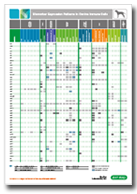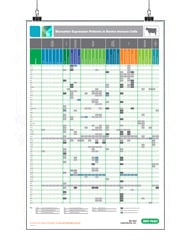Canine Animal Model Range - Anti-Dog Antibodies

- On This Page
- Overview
- Canine antibodies and reagents
Biomarker Expression Patterns Posters
s
Overview
Bio-Rad offers a range of monoclonal canine antibodies and recombinant proteins to enable scientists to study immune responses in dogs.
A thorough understanding of the canine immune response is critical for assessing the general health of dogs and investigating lymphomas, viral infections, (e.g. Canine Distemper Virus), and parasitic infections (e.g. Leishmaniosis). Additionally dogs are relevant translational animal models for numerous diseases such as cancer, musculoskeletal problems (chronic osteoarthritis, cruciate ligament), spinal cord injury (intervertebral disk herniation), and genetic disorders (Duchenne muscular dystrophy, hemophilia). The study of the canine immune response is often a prerequisite for the thorough understanding of these diseases.
 Canine Immune Cell Biomarkers Poster
Canine Immune Cell Biomarkers Poster
Biomarker expression chart listing key cell surface markers expressed on dog leukocytes, a guide to aid defining canine immune cell populations.
Download Now
However, the key application for canine models is cancer; half of all canine mortality over the age of 10 is linked to cancer. Naturally occurring non-Hodgkin’s lymphoma in dogs was used as an animal model for the development of Ibrutinib, an inhibitor of Bruton’s tyrosine kinase approved for mantle cell lymphoma and chronic lymphocytic leukemia therapy in humans.
Dog Antibodies
Our anti-canine antibodies are available with a range of conjugates and tested for reactivity to canine markers. They are suitable for a range of applications including flow cytometry, western blotting, immunohistochemistry, immunofluorescence, immunoprecipitation and ELISA. Each is performance guaranteed for the applications listed on the product datasheet.
Our Anti-Canine / Dog Antibody Range
| Description | Target | Format | Clone | Applications | Citations | Code |
|---|



